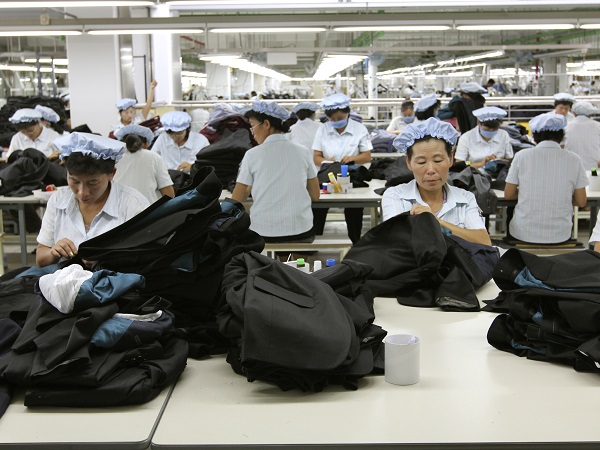N. Korea threatens to pull its workers from joint industrial zone

In this Sept. 21, 2012 photo, North Korean workers assemble Western-style suits at the South Korean-run ShinWon Corp. garment factory inside the Kaesong industrial complex in Kaesong, North Korea. On Wednesday, April 3, 2013, North Korea refused entry to South Koreans trying to cross the Demilitarized Zone to get to their jobs managing factories in the North Korean city of Kaesong. Pyongyang had threatened in recent days to close the border in anger over South Korea’s support of U.N. sanctions punishing North Korea for conducting a nuclear test in February. AP/Jean H. Lee
SEOUL – North Korea threatened Thursday to pull its 53,000 workers from the Kaesong joint industrial zone with South Korea and close the complex, a day after it blocked access for South Korean personnel.
A spokesman for the North’s Committee for Peaceful Reunification of Korea (CPRK) said it was responding to the South Korean defence minister’s statement Wednesday that there was a “military” contingency plan to ensure the safety of South Koreans in Kaesong.
“If the South Korean puppets and conservative news media keep badmouthing (us), we will order all our workers to pull out from Kaesong”, the spokesman was quoted as saying by the official KCNA news agency.
“The full closure of the complex is set to become a reality,” he added.
Pyongyang informed Seoul on Wednesday it was stopping the daily movement of South Koreans to Kaesong, the last real surviving point of contact between the two countries.
Article continues after this advertisementThe South’s Unification Ministry said that as of midday Thursday (0300 GMT), there were 812 South Korean citizens in Kaesong, which lies 10 kilometres (six miles) inside North Korea.
Article continues after this advertisementThe North has said the South Koreans in the complex could leave when they wanted, but hundreds opted to stay to keep their plants running.
Speaking to South Korean ruling party MPs on Wednesday, Defence Minister Kim Kwan-Jin reassured them that there was a contingency plan, “including possible military action,” in the event of the South’s citizens coming under threat.
The CPRK spokesman said Kim was “rambling” and warned that any military provocation against the Kaesong complex would result in the “self destruction of the enemy forces.”
Kaesong is “teetering on the verge of collapse,” he added.
Established in 2004, Kaesong is a crucial source of hard currency for North Korea.
Neither of the Koreas has allowed previous crises to significantly affect the complex, which is the only surviving example of inter-Korean cooperation and seen as a bellwether for stability on the Korean peninsula.